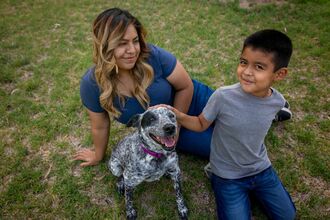-
Support Safe, Humane Communities for People and Pets in Bernalillo CountyEarlier this year, the New Mexico state legislature passed a humane initiative memorial [HM024]. Memorials (or resolutions) are a way for the state legislature to express legislative desire through declaration, frequently addressed to other governmental bodies, such as local government. A humane resolution makes the statement that elected officials want to see local municipal agencies and animal shelter managers work toward ending killing in shelters. They help to draw a line in the sand, and get everyone on the same page, driving toward the goal of saving the lives of dogs and cats. Now it’s time for local communities to commit their support for lifesaving by passing a humane resolution.279 of 300 SignaturesCreated by Page P.
-
Consider being a “pet inclusive“ landlord to increase your profitabilityBecoming pet-inclusive: The right thing to do. A 1998 study found that 29 percent of pet relinquishments to animal shelters were because of housing issues, primarily having to move. And the most common specific reason given for relinquishment was “landlord refused to allow pets.” Tragically, this percentage has probably increased with the foreclosure crisis. Every day, more than 950 cats and dogs are unnecessarily killed in America’s shelters, simply because they don’t have a home. Each one of these pets is an individual and a valued life worth saving. That number should be zero, and it can be, if landlords and property management companies do their part to make more pet-inclusive housing available. Lead by example. Together, we can Save Them All.120 of 200 SignaturesCreated by Jill G.
-
Tell insurance companies to stop discriminating against dog breedsTwo-thirds of American households include at least one cat or dog, which makes having a pet-inclusive place to call home essential for most Americans. Given the huge demand, one might think there would be enough pet-inclusive housing for renters. Unfortunately, housing-related issues are the second most common reason that families surrender a pet to an animal shelter. These housing issues may pertain to insurance issues, landlord restrictions, or limitations placed on the physical animal. Many rental and government-subsidized housing make it difficult to own a pet. Even properties that are "pet-friendly" might have pet weight limits, such as "no dogs over 25 lbs" or breed restrictions. When families are forced to choose between securing a place to live and keeping their family pets, they may see surrender as a last resort. As a trillion-dollar industry, the housing sector can be a positive influence in creating an inclusive and humane community. Additionally, more than 90% of housing providers and residents agree that pets are an important part of families. Welcoming all pets is good for business because residents stay significantly longer in housing that is pet inclusive (2). Expanding affordable and accessible pet-inclusive housing is necessary to ensure that families don’t have to choose between housing and valued members of their family. Let’s work together to end housing restrictions for pets and their families.206 of 300 SignaturesCreated by Stacey S.
-
Stop the state of New York from discriminating against dog breedsTwo-thirds of American households include at least one cat or dog, which makes having a pet-inclusive place to call home essential for most Americans. Given the huge demand, one might think there would be enough pet-inclusive housing for renters. Unfortunately, housing-related issues are the second most common reason that families surrender a pet to an animal shelter. These housing issues may pertain to insurance issues, landlord restrictions, or limitations placed on the physical animal. Many rental and government-subsidized housing make it difficult to own a pet. Even properties that are "pet-friendly" might have pet weight limits, such as "no dogs over 25 lbs" or breed restrictions. When families are forced to choose between securing a place to live and keeping their family pets, they may see surrender as a last resort. As a trillion-dollar industry, the housing sector can be a positive influence in creating an inclusive and humane community. Additionally, more than 90% of housing providers and residents agree that pets are an important part of families. Welcoming all pets is good for business because residents stay significantly longer in housing that is pet inclusive (2). Expanding affordable and accessible pet-inclusive housing is necessary to ensure that families don’t have to choose between housing and valued members of their family. Let’s work together to end housing restrictions for pets and their families.172 of 200 SignaturesCreated by Hsiu-Ching T.
-
Stop insurance companies from discriminating against people of color and the pets they loveThe vast majority of insurance companies use dog breed as a factor in determining whether to issue a homeowners insurance policy. Breed lists used by many companies are comprised of large dogs that are considered — without proof — to be more aggressive than other dogs based solely on their breed or appearance. To make matters worse, those living in ZIP codes commonly associated with people of color are more likely to be denied insurance if they live with a large-breed dog. Homeowners insurance exclusions, like the discriminatory practice of redlining, deny people of color and their pets fair access to the privileges and protections other American homeowners enjoy. Senate Bill 1672 has been introduced to stop breed-based insurance discrimination in Illinois. What passing Illinois Senate Bill 1672 will accomplish: (1) It closes a loophole that allows unscrupulous insurers to circumvent longstanding anti-discriminatory legislation like the FHA (2) It removes barriers to Black and Brown homeownership (because some might not be able to purchase a home if they have the 'wrong' dog) and hence encourages upward economic mobility (3) It allows Black and Brown families equitable opportunities for pet ownership, which is arguably not only part of the American dream, but also important to the mental well-being of pet owners Although insurance companies may claim that these restrictions are based on risk, scholars have argued that focusing on the breed of a person's dog can enable companies to engage in discrimination based on race (due to preconceived notions of who often owns restricted breeds) The focus should always be put on the behavior of the dog and the behavior of the owner instead. Arbitrary breed restrictions prevent otherwise responsible dog owners from acquiring adequate homeowners/renters insurance and forces many to give up their beloved dog companions before moving into state-subsidized housing. Breed restrictions also prevent well-mannered dogs from being adopted and infringe on a family's right to choose the best dog for them. Research on breed and behavior: * Researchers at Tufts University concluded that factors associated with actions of the owner —like the absence of an able-bodied person to intervene — are the primary cause of dog bite-related fatalities while the breed is not a factor. Source: https://www.ncbi.nlm.nih.gov/pubmed/24299544 * A recent study asked 16 animal shelter workers to guess the breed of 120 dogs. While the shelter staff collectively identified 52% of the dogs as pit bull-type dogs, DNA tests proved that only 21% had any pit bull mix in them. Source: https://www.sciencedirect.com/science/article/pii/S109002331500310X * A study published in the Journal of Veterinary Behavior compared aggression between banned dog breeds and a control group of golden retrievers using temperament tests. Comparing the results of golden retrievers and breeds affected by breed discriminatory legislation, no significant difference was found. The researchers concluded that "A scientific basis for breed-specific lists does not exist." Source: https://www.sciencedirect.com/science/article/abs/pii/S155878780700264X875 of 1,000 SignaturesCreated by James E.

-
Tell the state of Illinois to stop discriminating against dog breedsBreed labels are often applied without actual knowledge of a dog’s specific breed. The science shows that breed is not a factor in bites. The focus should be on the behavior of the dog and the behavior of the owner. Breed restrictions prevent responsible dog owners from acquiring adequate homeowners/renters insurance or require them to give up their dogs before moving into state-subsidized housing. Plus, breed restrictions prevent well-mannered dogs from being adopted and infringe on a family’s right to choose the best dog for them. And breed lists can also have an impact on people of color, which calls into question whether insurance consumers are treated fairly and equitably.274 of 300 SignaturesCreated by Ledy V.






